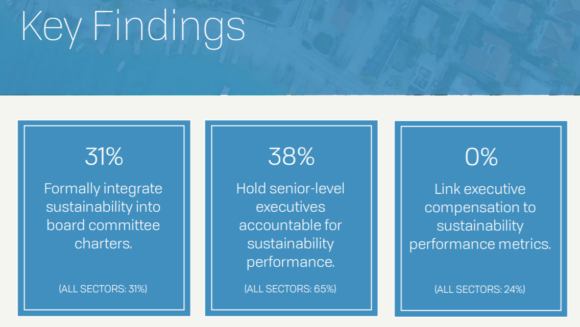A new report from a sustainability advocate gives two green thumbs down to the U.S. insurance industry for its inability to grow its efforts, or its interest, in dealing with climate change compared with other sectors.
The report, TURNING POINT: Corporate Progress on The Ceres Roadmap for Sustainability, examined how more than 600 large publicly traded companies have reportedly made progress against 20 key expectations of sustainability leadership – this includes areas of governance, disclosure, stakeholder engagement, environmental and social performance.
This week Boston-based leadership sustainability advocate Ceres released an analysis of data from the report that looks specifically at how 32 U.S.-based insurers are establishing, implementing and disclosing business strategies that drive improved performance across areas like climate change and human rights.
The insurance industry doesn’t compare too well against other sectors, nor even closely related sectors, such as banking. The banking sector, for example, is doing well with setting greenhouse goals and clean energy targets – 35 percent of companies are reportedly setting these goals compared with 36 percent across all sectors. But in the insurance sector only 9.4 percent have set what Ceres calls “time-bound, quantitative” goals for greenhouse emissions, and none have set such goals for clean energy targets.
The insurance sector analysis shows that just three companies have committed to reducing greenhouse gas emissions: MetLife, Travelers and The Hartford. It was originally listed as only two companies meeting this threshold in the report, but the report has since been corrected to add The Hartford, and so has this column accordingly.

“They’re not holding themselves to account,” said one of the report’s authors, Kristen Lang, director of the company network at Ceres.
The analysis finds what authors believe are deficiencies not only on the operational side, but on the investment side too.
Download one or both reports at the Insurance Journal Research section.
Roughly 16 percent of insurance companies are proactively engaging external stakeholders on sustainability issues, and only 28 percent of companies are engaging investors on these topics via their annual general meetings, earnings calls and other investor forums, the analysis shows.
Lang said that based on her findings, it appears the insurance sector is just disinclined to have these types of discussions.
Only 31 percent of insurers have formal board oversight for sustainability, and just 38 percent of the sector hold senior executives responsible for sustainability performance compared with the overall average of 65 percent, according to the analysis.
Insurers may be figuratively shooting themselves in the foot by not doing more to address sustainability issues, the report’s authors note.
A goal of the insurance industry as a whole has been to attract younger professionals to address the aging population of the sector.
Among those groups the industry is most interested in are Millennials. This is a group that’s often perceived to have significant interest in working for companies with a strong sense of social and environmental responsibility – 76 percent this group now regards business as a force for positive social impact, according to The Deloitte Millennial Survey 2017.
Millennials are expected to comprise 75 percent of the workforce by 2025, yet just 16 percent of insurers are training employees on sustainability topics compared with 38 percent across all sectors, the analysis shows.
Not surprisingly, the analysis addresses the industry’s investment in fossil fuels, which has become a common and recurrent theme from a number of reports and some state regulators who say these investments put company financials at risk.
“Due to the past decade’s low interest rates, insurance companies have had much less wiggle room in their finances, putting pressure on the industry to find higher yield, more stable investments,” the report states. “Historically, investments in utilities and fossil fuels have met these requirements, so the portfolios of insurance companies often have significant fossil fuel exposure. However, this dynamic is changing rapidly: fossil fuel investments may now pose a risk to insurers’ profitability, since their value might decrease in a carbon-constrained future — and these outlays represent a lost opportunity to invest in the growing clean energy sector.”
The analysis isn’t all down on insurance companies. American International Group is called out as being among a few insurers that are presenting climate change as both a business risk and an opportunity.
AIG’s 2017 annual financial filing states that climate change-related catastrophic events pose a threat to property and could create lost assets, increase claim costs and interrupt operations.
“AIG also frames climate change as an opportunity,” the analysis states. “The company says its underwriting, product development, modeling and sustainability services can adapt to climate-related risks and provide customers with innovative products and services that anticipate these risks.”
Disclosing sustainability information on financial reports and documents is another insurance industry high point in the analysis, which shows insurers are far better than other sectors in this regard.
“This sector is among the highest,” said another report author, Dan Saccardi, director of company network for Ceres.
Seventy-two percent of insurers are disclosing that information compared with 51 percent across all industries, according to the analysis.
Part of that may be that the insurance industry is more regulated than other industries.
“Some of that can be more on the boilerplate side of things, and some of that can be more concreate as it relates to a company’s business strategy,” Saccardi said.
Past columns:
- Climate Change Act: Commit New York to Being Powered by 100% Renewables
- Youths’ Climate Change Suit Has Potential Impact on a Historic Scale for Insurance
- Study Links Severe Winter Weather in Northeastern U.S. to Arctic Temps
- Startup Modeler Jupiter Wants to Better Predict Impacts of Climate Change
- Climate Change and the ‘Fire Insurance Predicament’
Was this article valuable?
Here are more articles you may enjoy.



 Vintage Ferrari Owners’ Favorite Mechanic Charged With Theft, Fraud
Vintage Ferrari Owners’ Favorite Mechanic Charged With Theft, Fraud  Progressive Records Five-Fold Increase in Q1 Net Income
Progressive Records Five-Fold Increase in Q1 Net Income  Undercover St. Louis Officer Beaten by Colleagues Awarded $23.5M
Undercover St. Louis Officer Beaten by Colleagues Awarded $23.5M  Coral Gables, Florida Tops Beverly Hills as Ritziest Home Market in US
Coral Gables, Florida Tops Beverly Hills as Ritziest Home Market in US 

